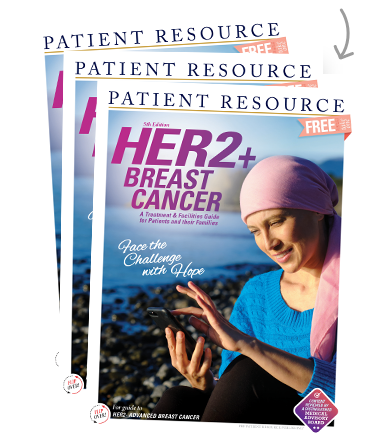HER2+ Breast Cancer
Community
H aving support throughout treatment for breast cancer makes a significant difference in your emotional and physical health. Not everyone, however, has an “automatic” person to fill that role. Fortunately, the cancer community is tight-knit and full of members who are dedicated to taking care of each other.
Looking ahead to treatment without another adult by your side is scary. You may live alone. You may be a single parent with a child at home or live with an elderly family member, neither of whom you can rely on for day-to-day physical help and emotional support. Or you may have someone at home but prefer to share your feelings with someone who has experienced breast cancer, either as a survivor or by helping someone who has. Regardless of your situation, it is important to have a solid support system and find a personal champion to help you through.
Research shows that people with cancer who can address their emotions in a healthy way spend less on health care, adhere better to the protocols in their treatment plan, have fewer bouts of depression and are less distressed. They simply feel better.
Support is out there — you just need to know where to look.
- Tell your health care team that you live alone or need assistance. They can assign a social worker to you who has access to many resources, from housekeeping and child care services to caregivers who can help with personal care and manage your ports or drains following surgery.
- Find a local group that offers free cancer resources. According to Siobhan McLaughlin Lesley, Executive Director at Gilda’s Club Kansas City (gildasclubkc.org), they personalize the experience for every individual that comes in by conducting a Welcome Interview. “Everyone is unique, so we like to find out what is important to that person,” she explained. “It may be how to manage side effects, ensuring they can live independently during and after treatment, or learning how to talk to their kids about cancer. Some topics are addressed in support groups or panel discussions and others more informally during expressive art and writing classes. We offer many opportunities to learn from and support each other. I feel so fulfilled when I hear laughter coming from a support group.”
- Most organizations won’t have everything you need, but they are part of a much bigger community that works together. “We refer to other programs offered by hospitals, advocacy groups and organizations to ensure their needs are met,” Siobhan said. “We want people to know that community is stronger than cancer.”



